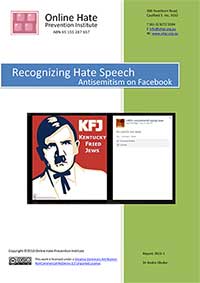This report tracks the response by Facebook to a catalogue of antisemitic content including that in OHPI’s 2012 report into “Aboriginal Memes and Online Hate”. A number of items discovered at the same time, but not included in OHPI’s report are included here for the first time. The report also examines complaints that have been lodged with Facebook against specific items of content, and which were incorrectly rejected, highlighting a quality control problem. Finally, seventeen new Facebook hate pages have been listed along with examples of the antisemitic content found on these pages.
This report highlights that there are ongoing problems with antisemitic content at Facebook, and that some of these problems are not simply a matter of volume, but are a result of quality control issues in the complaint management process. The report also highlights that where Facebook is provided with detailed analysis, such as in OHPI’s reports, Facebook has been willing to engage and reconsider the problem holistically. Most of our initial concerns from October last year have been addressed. The problem this report addresses is that the remaining items appear not to be recognised as hate speech by Facebook. The new additions to this report help clarify where the remaining issues are.
Two key issues are discussed in this report at length. The first is the problem of Jewish Memes and the second is the specific problem of the Protocols of the Elders of Zion. There are limits to the expertise of Facebook staff, even at senior ranks, and new processes are needed to make better use of external experts as well as working to increase the level of knowledge within Facebook review teams. This applies not only to antisemitism, but to knowledge of other forms of hate as well. This report provides a number of recommendations, including guidelines in Recommendation 5 for assessing the response of a platform like Facebook to Hate Speech.
This report’s broad conclusion is that the standard reporting tools available to all Facebook users, and the review by front line staff in response to these reports, has a significant failure rate and is not on its own a sufficient response when it comes to antisemitism. It seems likely this holds equally true for other forms of racism. Tackling such hate can require significant background knowledge. New processes, including a review of complaints that are initially rejected, are needed in order to better respond to the problem of online antisemitism. A process of continual improvement needs to be adopted.
Dr Andre Oboler
Melbourne
16 March 2013



